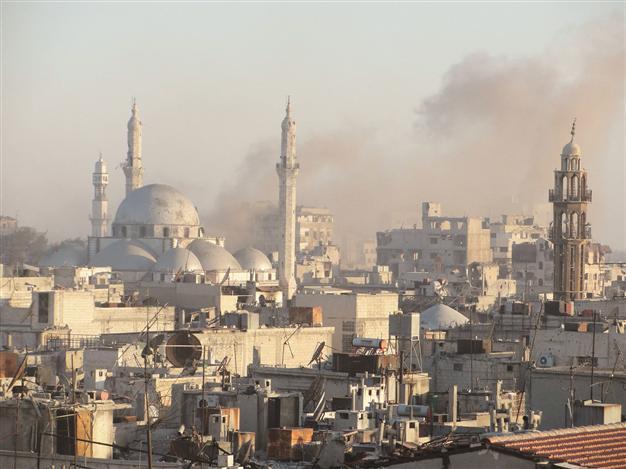Senior Syrian Kurdish official assassinated near border
ANKARA

Smoke rises near Khalid bin al Walid Mosque in the Khalidiyah district of Homs in this photo. A car bomb kills a prominent Syrian Kurdish politician in the city of Qamishli, near Turkish border. REUTERS Photo
prominent Syrian Kurdish politician was assassinated on July 30 outside his home near the Turkish border when a bomb planted in his car exploded.Isa Huso, a member of the Supreme Kurdish Council diplomacy committee was assassinated as he left his house in the morning in the Syrian Kurdish city of Qamishli. Huso, 60, had worked for Kurdish freedom and actively participated in the founding congress of the Kurdish Democratic Union Party (PYD). The PYD is the main Kurdish party in Syria and is considered a branch of Turkey’s outlawed Kurdistan Workers’ Party (PKK). Turkey’s Peace and Democracy Party (BDP) condemned the attack, saying it had been perpetrated against all Kurdish people.
‘Don’t side’ with the al-Assad regime
Kurdish-umbrella organization the Democratic Society Congress (DTK) also condemned the attack. Huso was also a member of the council of the Rojava (the Kurdish northern parts of Syria) People Parliament.
Huso, married with 10 children, often became a target of the Syrian regime while fighting for freedom.
He was arrested five times, subjected to torture and served a one-year prison sentence. Meanwhile, Deputy Prime Minister Bülent Arınç has called on the Kurdish groups in Syria not to side with the al-Assad regime and urged them to support the opposition.
Arınç said the Syrian regime intended to exploit the Kurds and other groups in the northern region, and use them as a trump card against Turkey. “When al-Assad goes, and a democratic regime is established with a Parliament and elections, then everyone will be represented equally,” Arınç told state-run broadcaster TRT on July 29.
“All we ask of the formation there [Kurds in the north] is that they do not cooperate with al-Assad. Become a part of the opposition and do not attempt to take control by fait accompli,” he added.
“Your presence and equal citizenship rights will definitely be recognized in a Constitution to be formed after al-Assad. If you side with the opposition, you can avoid sharing the sins of the regime,” he said.
Meanwhile, the United Nations’ food agency said that 600,000 Syrians could not receive aid this month as spiralling violence prevented convoys from reaching them.
Elisabeth Byrs, spokeswoman for the World Food Programme (WFP), told reporters that the agency had aimed to reach a total of three million people in Syria in July, but had succeeded in getting supplies to only 2.4 million.
“Rising violence in many parts of Damascus and Homs, and a proliferation of checkpoints around the main cities have hit the flow of food distribution,” she said.
The number fed in July was also lower than the 2.5 million Syrians the WFP helped in June.
















